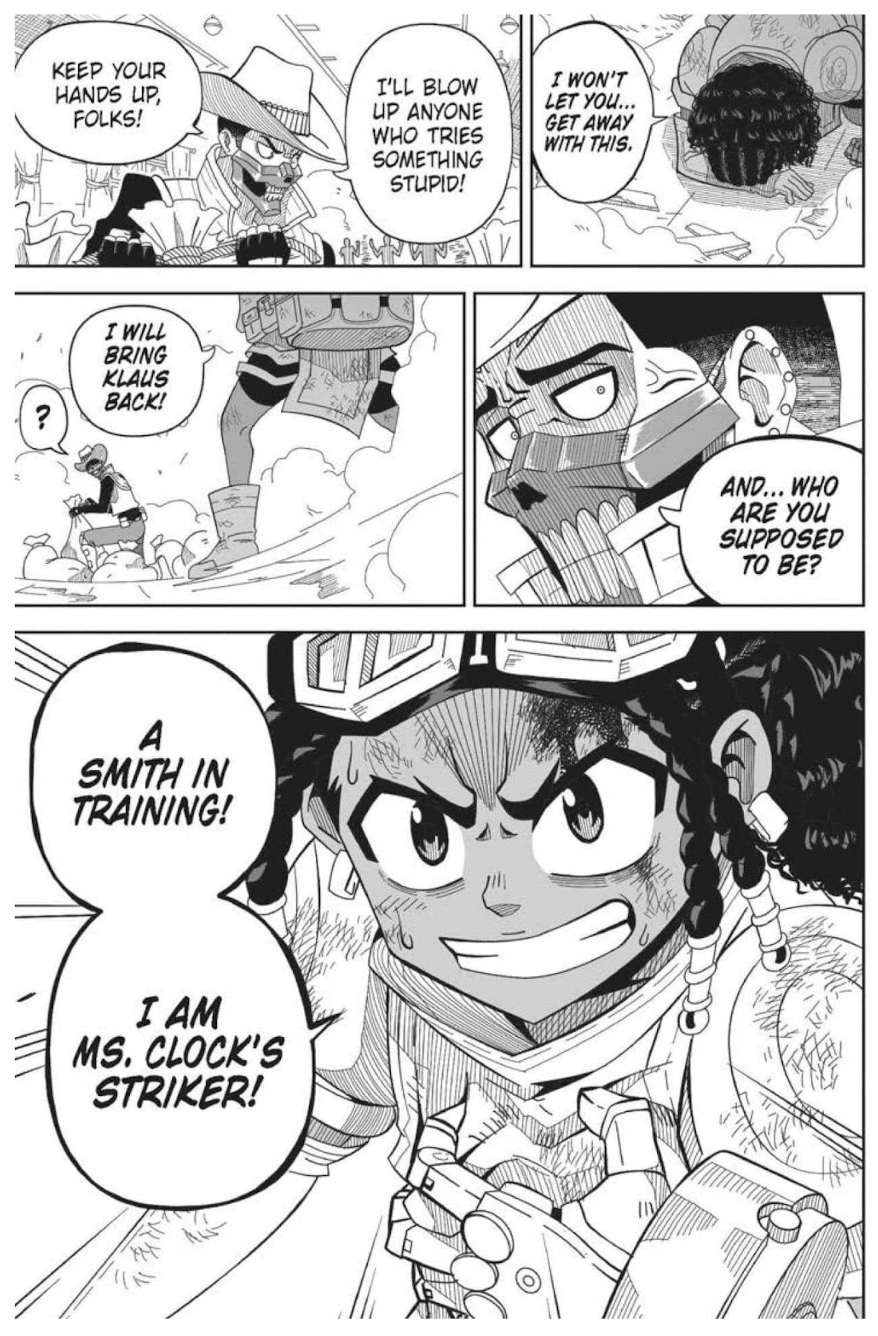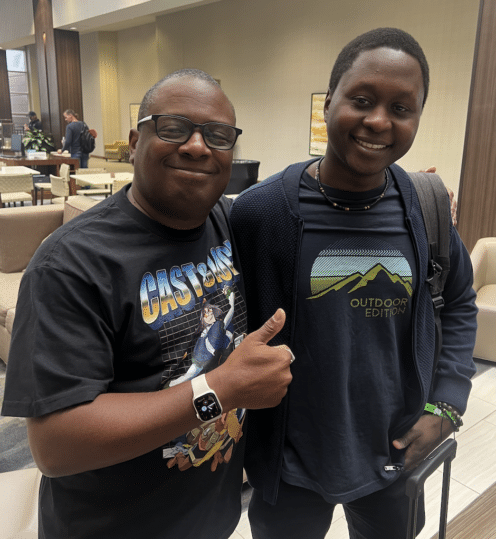Despite their monochromatic renderings, Frederick L. Jones’ characters leap off the page. The antics of Naomi and Tony in Yellow Stringer, as they report on the supernatural. The tense mysteries of The Massively Multiplayer World of Ghosts, full of thrills, spills, and chills. The outlandish baddies and intrepid heroine in Clock Striker, perfectly fits his manga anthology, inspired by the famous Weekly Shōnen Jump.
These characters represent Jones’ life in more ways than one. Yes, they’re part of his work; new IP for the publishing imprint he founded, Saturday AM, where he empowers young creators.
But these stories also represent his childhood and his passions. The characters, creative and fantastical, hark back to the Saturday mornings of his childhood in the late ‘70s and early ‘80s. Major channels blocked out hours on the weekend morning and blasted the airwaves with weird and wild cartoons that defined a young generation.
“Calling it magical downplays just how incredible that time was,” said Jones, founder of the black-owned publishing and entertainment company MyFutprint Entertainment and its aptly named manga imprint Saturday AM. “Those mornings were the first time I felt like I could explore my imagination so fully.”

Jones’ storytelling instincts take over as he recalls how he drew physical TV schedules by hand, so he never missed his favorite shows. The ritual was just as important as the shows to him, and that sense of wonder and imagination nurtured him to dream wild, wonderful ideas.
Finding the audience
Jones channeled that creativity into his early career. He started working as a project manager for the publisher Gathering of Developers. Jones worked on titles like Railroad Tycoon II, Kiss Psycho Circus, and an early version of the 2001 neo-noir shooter Max Payne, before transitioning to a role at Blockbuster.
Jones oversaw video game accessories and hardware assortment for Blockbuster stores nationwide. Because of his experience and knowledge of the manga space, Jones was primed to see opportunities where others couldn’t.
“We were headed into earnings at the time, and I was looking at the numbers for all our US stores,” Jones said. “I found that we were making a million dollars a month selling a magazine about the Yu-Gi-Oh! trading card game, and we weren’t even selling the cards!”
The Yu-Gi-Oh!, based on the shōnen manga of the same name, had found a huge following stateside; the manga and anime were localized, video games published, and it’s still a pop-culture touchstone for many. That popularity seemed obvious to Jones—of course, this popular manga about high-stakes games and protecting your friends found an audience—but it led him to reflect on his perspective and experiences.
“There are things that may seem obvious to you because of your quirks, but others may not see it. For me, that was anime and manga,” explained Jones.
“With ‘Yu-Gi-Oh!’ I could just tell it would be big because I loved these things growing up. I felt firsthand how they create excitement, engagement, and fandom for everyone.”
Jones started looking around at the comic and manga industries and realized that despite this universal appeal, the stories were homogenous. The real lightbulb moment came when he found a talented black manga artist who hardly drew any black characters.

“When you have an audience that’s so diverse, you have an opportunity to tell all kinds of stories—and everyone has an interesting story to tell,” Jones said. “That’s why it’s so dangerous for publishers to never show that kind of representation, why it’s dangerous to never see the things that make you wonderful and unique on the manga page.”
The lack of representation just didn’t make sense, so Jones set out to make a difference.
Bringing Saturday AM to everyone
By the time Jones founded Saturday AM, his independent manga publisher, the industry was facing more competition for young people’s attention. Traditional competitors like sports and video games were being joined by the likes of streaming and social media. In a bold new world, the manga industry was slow to adapt, and Jones saw broader representation as the path forward.
“When you have an industry that’s somewhat blind to that diversity of perspectives and choices, that’s how you get mom-and-pop comic shops closing down and a shrinking industry,” he said. “You can’t be in this world and not see the importance of diversity.”
That’s why, from the bottom up, Saturday AM wasn’t just built with diversity in mind, it’s at the very core of the company. Jones’ team is diverse, and their stable of creators comes from all over the world, from Nigeria to Brazil.
“Our staff is diverse, which means all our people are empowered to share and express themselves. I can’t think of anything better than a world where everyone feels like that,” Jones said.
“Saturday mornings are for everybody, and we want to create a company to prove that.”
Creativity as empowerment
Creativity is at the core of everything Jones does. Particularly when he’s collaborating with artists, Jones feels that youthful, playful magic from his childhood.
“There’s something about Clock Striker, working with [artist] Issaka Galadima. I give him just a little description of a scene, but he takes it and makes it greater than what I ever could have dreamed,” said Jones. “It’s like two Lego blocks snapping perfectly together.” He’s quick to praise all the wonderful artists he works with, elevating and celebrating them whenever he can.

Jones also knows that his company faces a long list of challenges as a Black-owned business in a tough industry. Even here, he likes to lean into his creative side.
“Running a business is a constant creative exercise and the same rules of operations don’t apply equally to Black startups,” said Jones, “but the rewards are immense.”
“We dream big, because otherwise what’s the point of doing this?” he continued. “Creativity in my job is all about dreaming bigger and then figuring out how to make it a reality.”
The proof of Jones’ work will be in the next generation of readers, writers, and artists. If they can point to Saturday AM as inspiration to tell incredible stories, that’s a dream turned reality for Jones. That’s a lofty goal, admittedly, and Jones reveals a simpler, more holistic goal for his work.
“I just want to make art that inspires the next generation, even if they’re just inspired to love one another and themselves.”
Today, Saturday AM distributes a roster of stories from diverse creators all over the globe. Its manga titles are sold in brick-and-mortar stores as well as major e-commerce sites like Amazon. Their popular Clock Striker Vol 1 book, which Jones wrote, was nominated for the Dwayne McDuffie Award.
Western Digital is delighted to partner with Frederick L. Jones and Saturday AM on the 1TB SanDisk Extreme Portable SSD Afrofuturism Edition. The drive features the art of Issaka Galadima, the artist for the Clock Striker manga, along with various digital goodies, including the first chapter of various Saturday AM manga. Learn more here.
Artwork by Cat Tervo
